
After much anticipation, we’re thrilled to officially announce the public launch of zkCrossDEX, the first decentralized exchange on Partisia Blockchain
Initially available as an exclusive soft launch for our Telegram community towards the end of January, zkCrossDEX has undergone numerous improvements. From backend optimizations to front-end enhancements, here’s how zkCross have refined the platform ahead of today’s public debut:
As of today, zkCrossDEX is battle‑tested but remains in Beta. It is built to learn, adapt, and grow through live usage. Your feedback and insights remain essential. You can provide any bug reports, feedback and queries directly to zkCross via the Help Centre within their DEX application.
Before you read on to learn more about this public launch and what comes next, we’d also like to share Koala Wallet is increasing the accessibility of of our programmable confidentiality omnichain layer. zkCrossDEX, but more to come, all now available at your fingertips through Koala Wallet’s multi-chain mobile wallet.
zkCrossDEX is a foundational infrastructure essential for the growth of Partisia Blockchain’s expanding web3 ecosystem. Here’s why this launch marks a pivotal moment for Partisia:
From launch, zkCrossDEX will offer powerful capabilities:
Please keep in mind that while the platform is fully operational, this launch marks a Beta phase designed to optimize the DEX based on real-world use and continuous feedback.
Joining zkCross as an early adopter is straightforward.
Remember, to pay for transaction fees on Partisia Blockchain, you have the flexibility to use BYOC assets directly or wrap MPC (via Koala Wallet and the Browser.) Koala Wallet’s guide on bridging and gas or paying for transaction fees on Partisia Blockchain is available here.
Here’s how you can get started with Koala Wallet:
*You can onboard assets into Partisia Blockchain in multiple ways currently:
We’re working with zkCross and other relevant partners on increasing accessibility and liquidity. Please bare in mind that high volume transactions will result in high slippage. We highly encourage our community to provide liquidity across the core pairs to support increase depth across zkCrossDEX.
At zkCross, community involvement is paramount. We invite you to:
“zkCrossDEX is a core building block for DeFi on Partisia Blockchain, advancing on-chain liquidity, enhancing confidentiality and cross-chain interoperability”
— Kurt Nielsen, Co-CEO and co-founder, Partisia Blockchain
To celebrate and reward early participation, zkCross will introduce an based incentive program in the near future. Here are some top level info about their program coming soon:
In addition to this, we’ll be looking at the early birds who go and use our Partner’s exchange, with the objective of providing rewards, such as MPC and [REDACTED].
We’re also working closely with the zkCross team to launch subsequent campaigns to draw users and liquidity to Partisia Blockchain.
Look out for more information soon.™️
Today’s public launch is just the start. zkCross is committed to continuous improvement and innovation:
In the coming weeks:
Looking ahead:
Get started now:
Download Koala Wallet | Try zkCrossDEX
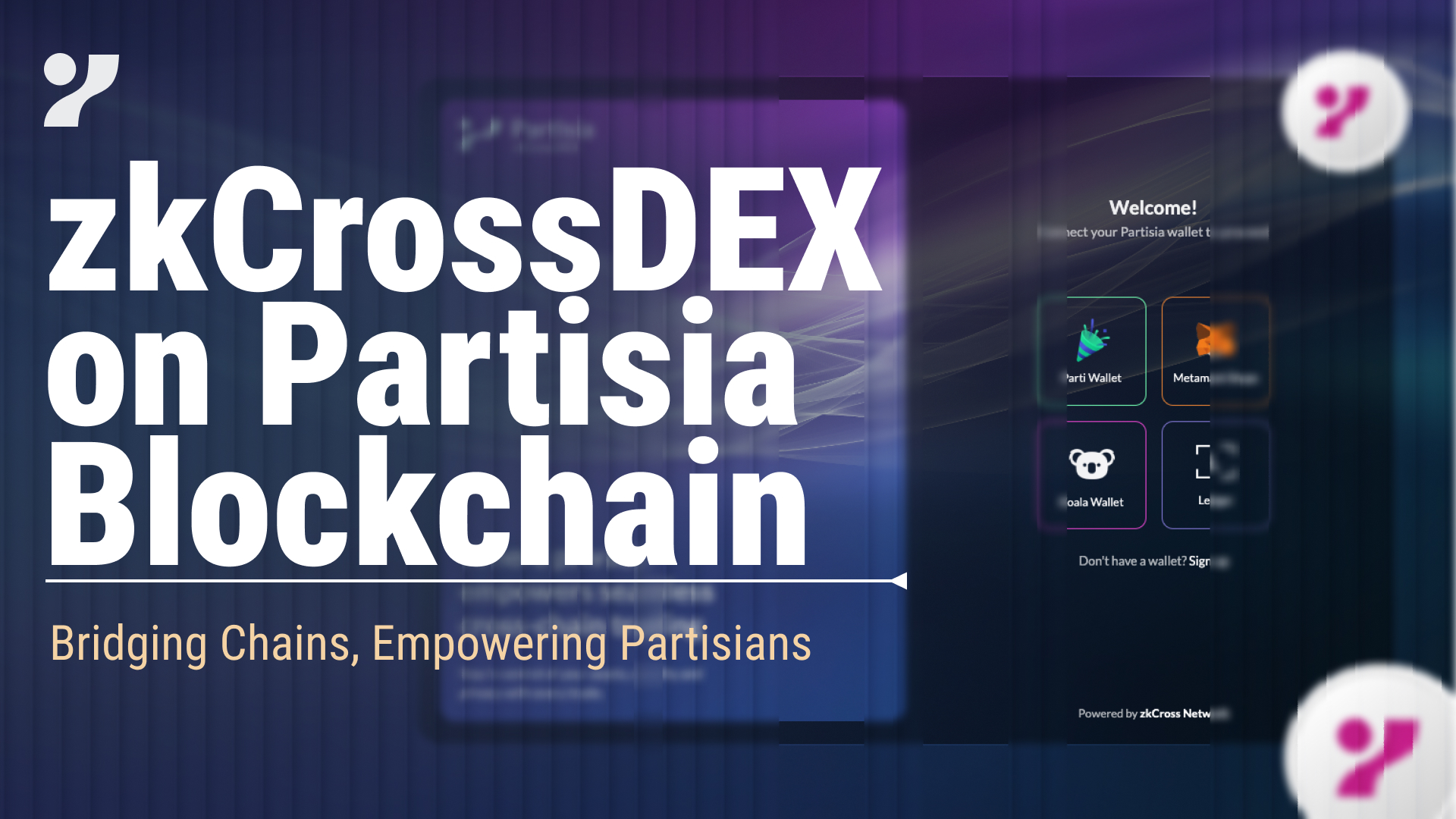
Ready to build a more confidential, scalable future?
Join the us at partisiablockchain.com and on X • Discord • Telegram • LinkedIn • Facebook • Instagram • GitLab • Medium • YouTube
Have you ever taken a trip to an amusement park? Then you are probably familiar with “amusement park dollars”. The park encouraging you to exchange your native currency to “amusement park” dollars because the only thing that is accepted in that amusement park is the currency of the amusement park. And of course, those amusement park dollars are not good anywhere else except in that park.
This is similar to how the public blockchain industry’s tokenomics works. If you want to play in the Solana ecosystem, you have to have the SOL token. Same with Cardano, where you need to pay using ADA. Theta is TFUEL, etc. The entire ecosystem model revolves around their specific currency.
And like amusement parks, every blockchain is in competition with each other. “We’re cheaper. We’re faster. We’re the easiest to develop on.” So on and so on…
In fact this “competition with each other” scenario has been seen throughout history. And it’s quite interesting to see, historically, who has been the winners in these types of competitions. VHS vs Beta in the 70’s, The desktop wars in the 80s, Ethernet vs Token Ring in the 90’s, search engine wars in the 2000’s, and the streaming war that is currently ongoing. And in almost all cases, the winners in these “wars” was the one who was collaborating rather than competing with others.
So the big question is….. Who is going to win the L1 public blockchain wars?
As mentioned above, the current state of the public “blockchain wars” is all about competing with everyone. The combination of every chain saying they are faster and cheaper, with the silo’ed tokenomic model of each chain forcing users to spend only in their currency locks every dApp in their own ecosystem. This is why interoperability has become one of the biggest topics in the industry.
But can we do it differently?
One of Partisia Blockchains core principles is interoperability. This is because our vision is to enable anyone to create solutions that help establish trust and foster collaboration and this means having an architecture that supports interoperability.
So in this regard Partisia Blockchain created a platform from scratch. And following the vision and principles we are adhering to, we created the concept of Bring Your Own Coin (BYOC).
BYOC basically means the users of the chain can pay for using apps developed on PBC using the coin they are most comfortable with. Or in other words, the gas payment on our chain is other liquid coins. This allows for the following possible features.
The Hermes bridge is a double-entry bookkeeping system securing the bridged asset through our MPC multi-sig oracle key. Currently supporting Ethereum, BNB and Polygon USDC, our roadmap includes others like bitcoin, ADA, XTZ and allows for simple integration to all other EVM compatible tokens. This interoperability and gas payment model opens up a variety of interesting use cases, such as the ability for users to interact with any dApp using their own currency of choice.
Our MPC-as-a-Service is also a unique feature of Partisia Blockchain. Our core vision is empowering anyone to be able to utilize our MPC services and to achieve this vision, we designed an architecture that allows anyone to call the blockchain, regardless of where their core app is built. Whether it is a traditional Web2 or a Web3 application that is built on a different chain, both can call Partisia Blockchain and compute using secret inputs without needing to port their entire application stack over to Partisia Blockchain.

By creating a programming language that allows for developers to use MPC in a generic way, and combining it with a unique interoperability and a scalability architecture, Partisia Blockchain Foundation has made the creation of applications that can harness the power of MPC for different use cases a possibility. Partisia has been at the forefront of providing private MPC solutions since 2008. And by layering this technology on top of an interoperable and scalable blockchain, Partisia Blockchain is now paving the way for anyone to create solutions that can balance privacy and transparency to build trust.
To learn more about different use cases or partner with us for solutions, please visit partisiablockchain.com, check out our Medium articles, development documentations or email us at build@partisiablockchain.com.
Ledgers are the primary ways settlements are recorded. The first double bookkeeping ledger system was recorded in use as far back as the 1300s. It is still the de-facto system used today to record transactions between entities.
Fast forward to 2008. Satoshi Nakamoto (pseudonym) was frustrated with the corruption due to the lack of transparency and centralized control of the traditional system. He proposed a transparent distributed ledger system that was immutable as a system of recording transactions. Thus Bitcoin was born.
But with all new systems, there is always room for improvements.
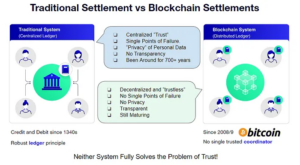
As discussed in our previous articles, full transparency does not solve the problem of building trust. In fact, privacy is a requirement in any trust relationship. For example, nobody would trust a credit card provider that revealed every purchase cardholders made just by someone having their credit card number. In a traditional blockchain space, every transaction is written in a public ledger. It would only require matching a wallet address to a name to see the full history of their transactions.
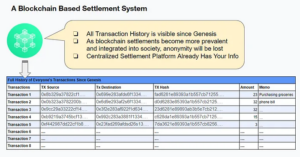
How can you have a blockchain that privatizes transactions and has enough flexibility to analyze and compute the data? Through integrating a proven technology into a scalable and interoperable blockchain.
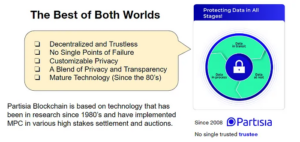
Developers can pick and choose which part of the data in the blockchain needs to be private and which can be public. All thanks to the Partisia Blockchain’s programmable MPC. A layer of governance can be enabled around the private data to allow for computation and access to select individuals. Those who access the data can also be audited transparently.
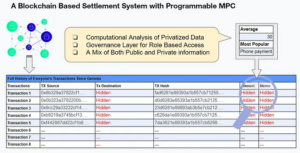
Now, even if someone has your credit card details, they will not be able to see your purchase history and your spending. If needed, a governance model can be created to ensure auditability and traceability to the system.
The importance is evident in our partnership with the International Committee of the Red Cross (ICRC). We partnered with the ICRC to build out a program for distributing aid through blockchain. One of their key requirements was privacy of the aid recipients. As they are a very unique organization, one of their key principles is in confidentiality and bilateral dialogue. The ICRC mainly operates in conflict zones and lack of privacy can mean life or death.
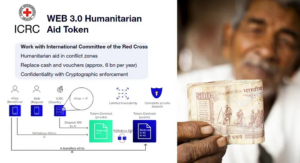
ICRC was able to solve their key challenge of privatizing the transactions of the stable tokens in the ecosystem thanks to Partisia Blockchain’s MPC. As shown above, the deposit of the funds from ICRC is kept private. As a result, transfers between the users are anonymous. To learn more, please watch our video of the overview of the solution here.
As blockchains become more prevalent, the need for privacy will continue to grow and take center stage. Various projects are already being built with private settlements in mind. We continue to speak with many organizations who prioritize the need for privacy in a blockchain solution.
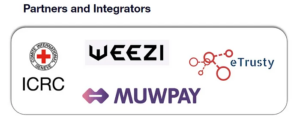
For additional insights on this use case, come and watch our Q&A session we did on this topic.
By creating a programming language that allows for developers to use MPC in a generic way, Partisia Blockchain Foundation has made the creation of applications that can harness the power of MPC for different use cases a possibility. Partisia has been at the forefront of providing private MPC solutions since 2008. And by layering this technology on top of an interoperable and scalable blockchain, Partisia Blockchain is now paving the way for anyone to create solutions that can balance privacy and transparency to build trust.
To learn more about different use cases or partner with us for solutions, please visit partisiablockchain.com, check out our Medium articles, development documentations or email me at bruce.ahn@partisiablockchain.com.
In a traditional asset trading platform, front running is defined as the illegal practice of placing a trade based on advanced non-public knowledge of an upcoming trade which can impact prices. As shown in the example below, a broker can take advantage of a situation when he or she gets a large order by one of their clients. Since they know this order will impact the price of the asset, they place their own personal order ahead of their client’s order. Then, they place the client order, raising the stock price. Once this is done they will sell their own shares to profit off their clients order.
Another term used often is insider trading, which is based on a very similar practice of using information only they have access to in order to gain an unfair advantage over others.
In the Web3 space, everything is transparent and, ironically, revealing too much information can also create these situations. An example of this is front running on a decentralized exchange (dex) that you may have already heard of. This type of a front running is possible through the combination of having total transparency in the blockchain along with how Ethereum (and many other blockchains) prioritize transactions in a node’s mempool.
In this particular example, an attacker (usually a bot) scans the mempool to see a particular scenario that they can take advantage of. Scanning the mempool, they look for an opportunity to insert in a bid at a lower price but higher gas than another large bid already in the mempool.
Once their bid completes, they wait for the larger order to go through, raising the price of the asset. Then they place a sell order at a higher price than the buy order he placed ahead of the larger order, and pockets the difference. All this is happening in a blink of an eye, making it impossible for any normal person to be able to recognize they are being taken advantage of.
But what if we could make the orders private? This prevents the attacker from being able to read the auction details in the mempool, and making the bot unable to identify a situation to take advantage of.
Through multiparty computation (MPC), details can be kept private while still computing the winner. In the situation of this dex, the results of the prices are not revealed until the bids are completed, ensuring that attackers cannot gain any advantageous information ahead of time.
The team in Partisia has already provided solutions to solve this issue in multiple scenarios. From governments to OTC trading platforms, they have been trusted to run high stakes auctions in different levels and through enabling this technology on a blockchain, we are giving everyone the power to solve the problem of ensuring integrity in the bidding process.
For additional insights on this use case, we recommend viewing our Q&A session on this topic.
By creating a programming language that allows for developers to use MPC in a generic way, Partisia Blockchain Foundation has made the creation of applications that can harness the power of MPC for different use cases a possibility. Partisia has been at the forefront of providing private MPC solutions since 2008. And by layering this technology on top of an interoperable and scalable blockchain, Partisia Blockchain is now paving the way for anyone to create solutions that can balance privacy and transparency to build trust.
To learn more about different use cases or partner with us for solutions, please visit partisiablockchain.com, check out our Medium articles, development documentations or email me at bruce.ahn@partisiablockchain.com